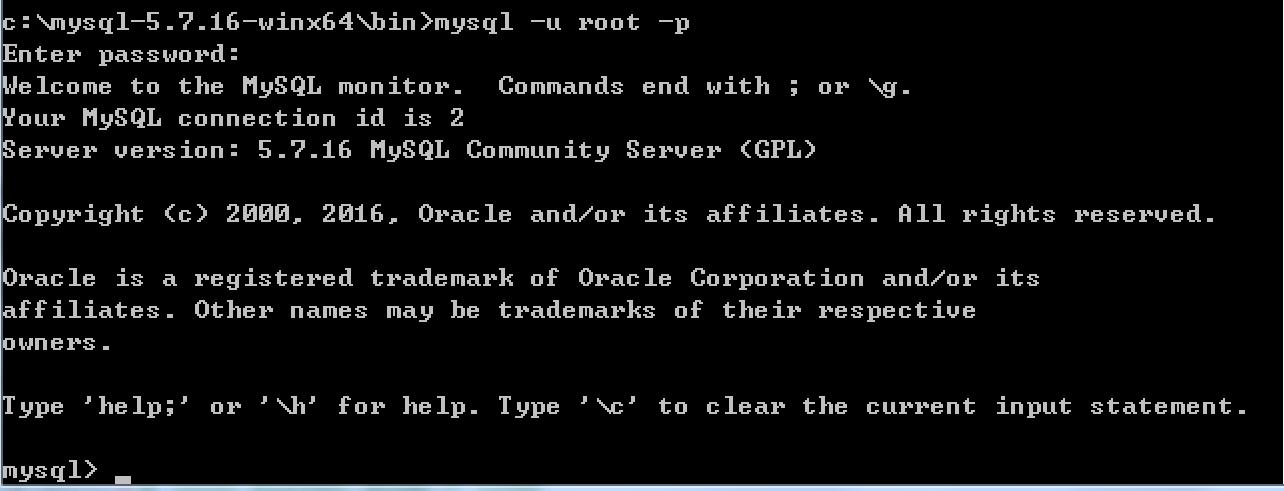mysql学习1
Posted qianxiamo
tags:
篇首语:本文由小常识网(cha138.com)小编为大家整理,主要介绍了mysql学习1相关的知识,希望对你有一定的参考价值。
1.什么是数据库?
数据的仓库,如在ATM的示例中创建了一个db目录,称其为数据库
2.安装
下载 http://dev.mysql.com/downloads/mysql/
安装
windows:
(1)解压:如果想要让MySQL安装在指定目录,那么就将解压后的文件夹移动到指定目录;
(2)初始化:MySQL解压后的bin目录下有一大堆可执行文件,执行如下命令初始化数据
D:\\mysql\\mysql5.7.16\\mysql-5.7.16-winx64\\bin\\mysql --initialize-insecure
(3)启动MySQL服务:
#进入可执行文件目录
cd D:\\mysql\\mysql5.7.16\\mysql-5.7.16-winx64\\bin
#启动MySQL服务
mysql
(4)启动MySQL客户端并连接MySQL服务
由于初始化数据时未给root账户设置密码
#进入可执行文件目录
cd D:\\mysql\\mysql5.7.16\\mysql-5.7.16-winx64\\bin
#连接MySQL服务器
mysql -u root -p
#提示输入密码,直接回车即可
见如下图表示安装成功:

2.1添加环境变量
【右键计算机】--》【属性】--》【高级系统设置】--》【高级】--》【环境变量】
以后再启动服务并连接时,仅需:
#启动MySQL服务,在终端输入
mysqld
#连接MySQL服务,在终端输入
mysql -u root -p
3.数据库操作
(1)显示数据库
show databases;
(2)创建数据库
create database db2; create database db2 default charset utf8;
#查看数据库
show databases;
#使用数据库
use 数据库名称
#删除数据库名称为db2的数据库
drop database db2;
(3)用户管理
#创建用户
create user "alex"@"192.168.1.1" ["用户名”@“IP地址"] identified by "123123"[“密码”];
#删除用户
drop user "alex"@"192.168.1.1"["用户名”@“IP地址"];
#修改用户
rename user "alex"@"192.168.1.1["用户名”@“IP地址"];to "alex1"@"192.168.1.2["新用户名”@“新IP地址"]
#修改密码
set password for "alex"@"192.168.1.1["用户名”@“IP地址"] = Password("新密码")
(4)授权管理
#查看权限
show grants for "用户"@“IP地址”
#授权
grant 权限 on 数据库.表 to "用户"@“IP地址”
#取消权限
revoke 权限 on 数据库.表 from "用户"@“IP地址”
4.基本数据表
( 1 )创建表
create table 表名(
列名 类型 是否可以为空,
列名 类型 是否可以为空
)engine=innodb default charset=utf8
( 2 )删除表
drop table 表名
(3)清空表
delete from 表名
truncate table 表名
(4)修改表
添加列:alter table 表名 add 列名 类型
删除列:alter table 表名 drop column 列名
修改列:
alter table 表名 modify column 列名 类型; -- 类型
alter table 表名 change 原列名 新列名 类型; -- 列名,类型
添加主键:
alter table 表名 add primary key(列名);
删除主键:
alter table 表名 drop primary key;
alter table 表名 modify 列名 int, drop primary key;
添加外键:alter table 从表 add constraint 外键名称(形如:FK_从表_主表) foreign key 从表(外键字段) references 主表(主键字段);
删除外键:alter table 表名 drop foreign key 外键名称
修改默认值:ALTER TABLE testalter_tbl ALTER i SET DEFAULT 1000;
删除默认值:ALTER TABLE testalter_tbl ALTER i DROP DEFAULT;
5.基本数据类型
MySQL的数据类型大致分为:数值,时间和字符串
(1)整数类型
tinyint, smallint, mediumint, int/intrger, bigint
(2)浮点数类型
float, double
(3)日期时间
date, datetime, timestamp, time, year

(4)字符串类型
char 速度快
varchar 节省空间
6.表内容操作
(1)增
insert into 表 (列名,列名...) values (值,值,值...)
insert into 表 (列名,列名...) values (值,值,值...),(值,值,值...)
insert into 表 (列名,列名...) select (列名,列名...) from 表
(2)删
delete from 表
delete from 表 where id=1 and name=\'alex\'
(3)改
update 表 set name = \'alex\' where id>1
(4)查
select * from 表
select * from 表 where id > 1
select nid,name,gender as gg from 表 where id > 1
(5)其他
a、条件
select * from 表 where id > 1 and name != \'alex\' and num = 12;
select * from 表 where id between 5 and 16;
select * from 表 where id in (11,22,33)
select * from 表 where id not in (11,22,33)
select * from 表 where id in (select nid from 表)
b、通配符
select * from 表 where name like \'ale%\' - ale开头的所有(多个字符串)
select * from 表 where name like \'ale_\' - ale开头的所有(一个字符)
c、限制
select * from 表 limit 5; - 前5行
select * from 表 limit 4,5; - 从第4行开始的5行
select * from 表 limit 5 offset 4 - 从第4行开始的5行
d、排序
select * from 表 order by 列 asc - 根据 “列” 从小到大排列
select * from 表 order by 列 desc - 根据 “列” 从大到小排列
select * from 表 order by 列1 desc,列2 asc - 根据 “列1” 从大到小排列,如果相同则按列2从小到大排序
e、分组
select num from 表 group by num
select num,nid from 表 group by num,nid
select num,nid from 表 where nid > 10 group by num,nid order nid desc
select num,nid,count(*),sum(score),max(score),min(score) from 表 group by num,nid
select num from 表 group by num having max(id) > 10
特别的:group by 必须在where之后,order by之前
f、连表
无对应关系则不显示
select A.num, A.name, B.name
from A,B
Where A.nid = B.nid
无对应关系则不显示
select A.num, A.name, B.name
from A inner join B
on A.nid = B.nid
A表所有显示,如果B中无对应关系,则值为null
select A.num, A.name, B.name
from A left join B
on A.nid = B.nid
B表所有显示,如果B中无对应关系,则值为null
select A.num, A.name, B.name
from A right join B
on A.nid = B.nid
g、组合
组合,自动处理重合
select nickname
from A
union
select name
from B
组合,不处理重合
select nickname
from A
union all
select name
from B
以上是关于mysql学习1的主要内容,如果未能解决你的问题,请参考以下文章